QuestionHi!
I just received a pair of lovebirds as a gift for my birthday. I've had them for 6 days now. They are about 9 weeks old and hand fed, but I don't know what sex they are. The birds are eating seeds for now. They don't bite when I try to handle them, but they are afraid and scuttle to the other side of the cage when I put my hands in.
I'm not sure how I should go about taming them. So far I've just sat by the cage and held out food while talking to them. I've asked a few people what to do and some tell me that it's okay if I keep the two of them together, and others tell me that I should separate them if I want to create any sort of bond. Could you give me some tips or methods on how to tame my lovebirds?
Thanks!
Deanna
AnswerHi. Thanks for your question and congratulations on your new lovebirds!
It is natural for new birds to be nervous...they are in a new place with new people in a new cage without their old "flock". Remember you or your first day of school? It'll be rough for a little while but with proper hand training, they can become more comfortable with you, especially since they were hand fed. Birds handfed by humans are much easier to tame. They will have already been used to handling, care, and the company of humans. However, this isn't a sure thing...I've seen many a handraised bird be a "bad apple" and I've also seen parent raised birds become tame just fine.
You will have to spend time getting them "used" to you and their new environment. Perhaps spending about 10-15 minutes, spread out over a few times a day (to keep them from being tired or overly stressed) at first. Remember throughout the process to use positive reinforcement...have them repeat what they did a few times and then use verbal praise and treats. When you feed and water them, move slowly and try not to speak loudly or scare them in any way. They may continue to scuttle away from you for some time.
Since they are somewhat shy right now, just sit next the cage...perhaps put it next to you while you watch TV, read, pay bills...occasionally acknowledging them by looking at them and saying their names calmly and sweetly. That will help them to understand that you are speaking to them. Hopefully they will then look at you when you speak in your "birdie" voice, sort of like how dogs do. They should then start looking forward to your attention. Once this happens...it should be okay to start hand training them. All birds move at their own pace and there isn't really a "timeline" for when a bird is ready for hand training.
You may want to initiate training by tempting them with food...whatever they like, like millet. Try this "handfeeding" until they are used to the idea of having your hand in their cage. This step could take a while and that is okay. it will help them also to not be scared of you when you are simply trying to change their food/water.
Keep doing this until they lets you pet them...try petting their chest/breast area first because your hand going for their heads may scare them. Also, most birds don't like being pet on the wings or legs. When they get used to you touching them in that area (which may also take some time, remember, baby steps) you can try pressing on their tummies a little bit as a cue for them to step up onto your finger. Since there are two of them, they may move at different paces...one may be more "outgoing" than the other but don't let that discourage you from continuing to work with the "shy" one.
Birds usually like stepping up and being higher than they are so make sure your hand is placed up higher than their feet. Sometimes birds will automatically place on foot up...another gentle push will cue them to step up again! This may take time and also may result in them jumping off or being scared. They might also try and bite at this time. It may be a "test bite" as they are testing to see with their beaks if your finger is a solid enough place for them to stand...not really a bite at all but more like their way of checking things out. They may also bite out of fear. Either way, when you are successful or if they bite, try not to make too much noise...even if its praise. Continue to speak softly and make slow movements, even if you get bit. I know its hard but if they know that they can keep you away from them by biting, they will continue to do that.
Once you get one to step on your finger, still keep your hand in the cage the cage, just on your finger. Try not to pull it out of the cage quickly. Eventually, after a few times on your finger, you can slowly take one out of the cage. It may get scared and jump or fly back in the first few times. If they get too scared and start flying around the room, remain calm when you pick it up...it should jump right on to your finger out of fear of being out of the cage.
As far as separating them...it all depends. You said that you don't know if they are males or females. It is possible to keep them together if you take some things into consideration. If they are of the same gender, they may become more territorial as they mature and start fighting with each other. Hopefully this will not be the case if they were raised together but with birds you never know. If the fighting goes on and is severe (they are biting and attacking each other) separate them immediately before one gets seriously injured or killed. You can always put up a divider in their cage or put them in separate cages right next to each other. If they are a male and female, you will need to expect that they may begin breeding (they don't get the name lovebird for nothing). Raising babies is very strenuous and time consuming and you may not want to do it as a new bird owner.
The only way to tell the gender would be if you had a dna sexing done (about 50 dollars, you can get a kit online but will need a sample of each birds' blood) or wait to see if either start laying eggs (female birds will lay eggs with or without a male present).
I understand what you are saying about not being able to bond with each bird if they are a pair. It is true that birds, when they select a mate, usually do not like the idea of someone handling their mate and can become jealous of you. however, introducing handling behavior right away while they are young can help them to understand that you are all one "flock" and should curb that behavior.
I hope this helps...just remember to remain calm and keep distractions to a minimum as they will be very shy at first. Make sure that there aren't hazards in the room you are doing your training in in case they fly around the room disoriented. Eventually, they may climb all the way up to your shoulder! Alot of birds do this instinctively as they like climbing and being up at the top of things. Just note that if they go up there...they could easily bite any earrings or jewelry you are wearing and either break it or choke on it. Birds are very curious about "shiny" things so keep that in mind. Also keep in mind that you may have a hard time getting them off of your shoulder once they go up there. They may not want to go back to your finger or back to their cage. With time and effort, they will trust you to handle them and you can begin understanding how to further bond with them. I hope this helps! Good luck and let me know how it goes. Alicia

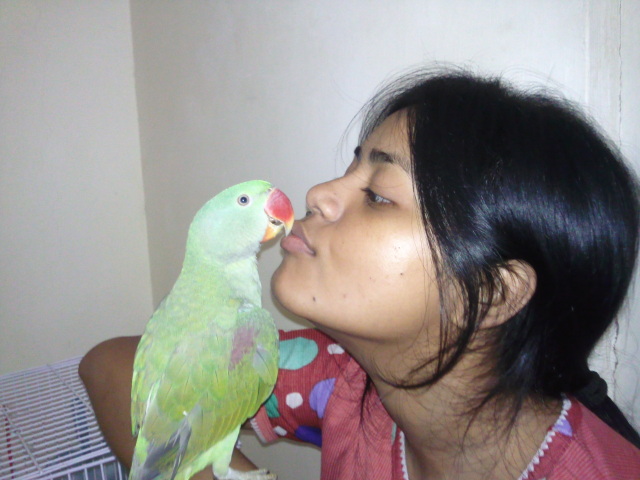 can i give my parrot chole(chana) called in hindi
Question
my little chaddi alexa
dear sir,
can give chan
can i give my parrot chole(chana) called in hindi
Question
my little chaddi alexa
dear sir,
can give chan
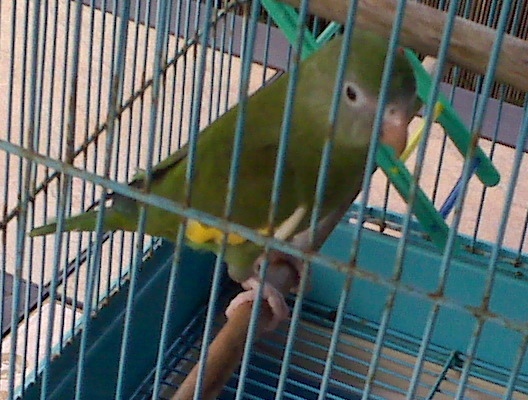 What type of parrot is this?
Question
Friendly bird
A week ago ths small parrot flew
What type of parrot is this?
Question
Friendly bird
A week ago ths small parrot flew
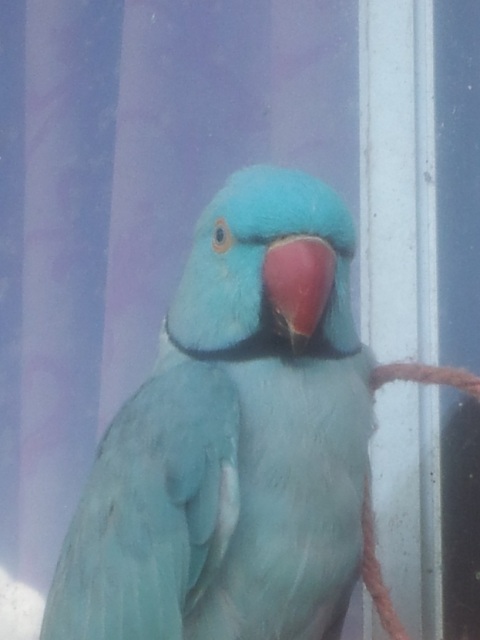 RE: Indian Ringneck probems
Question
Indy our Ringneck
Thank you for your he
RE: Indian Ringneck probems
Question
Indy our Ringneck
Thank you for your he
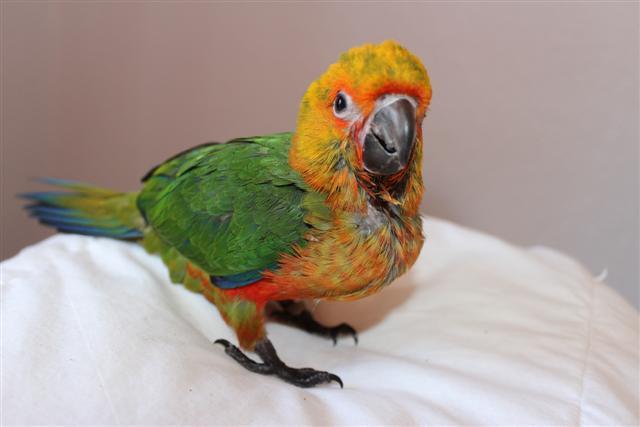 Jenday Conure Weaning?
Question
Castor the Conure
Hi
I have a 9 week o
Jenday Conure Weaning?
Question
Castor the Conure
Hi
I have a 9 week o
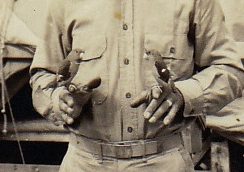 ID Birds
Question
Panama Birds
My uncle served in Panama in 1941
ID Birds
Question
Panama Birds
My uncle served in Panama in 1941